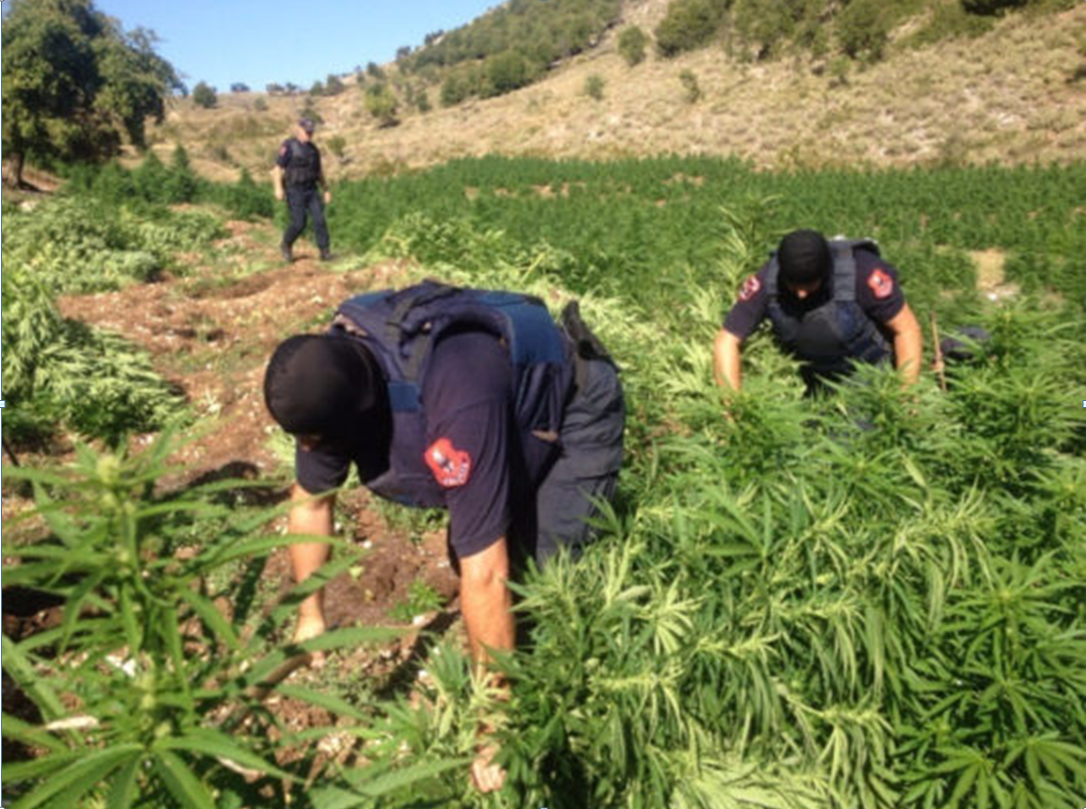[[{“value”:”
Albanian police during an anti-cannabis operation. Photo: State Police.
TIRANA, 4 June 2025 , (TT) — The Albanian government has approved the cultivation of cannabis for medical and industrial purposes, issuing licenses covering 29,000 hectares of land stretching from the north to the south of the country — a move hailed by officials as a boost to the economy but sharply criticized by the opposition and experts as a potential gateway to state capture by organized crime.
The decision, taken two months before the May 11 parliamentary elections, comes amid mounting evidence of Albania’s deep entanglement with international drug trafficking networks. Italian anti-mafia authorities and Finnish police have, in the last few weeks, announced sweeping operations targeting Albanian criminal groups involved in cocaine and cannabis trafficking across Europe.
A Troubled Past Resurfaces
Albania’s track record with drug cultivation is marred by the notorious 2015 operation that followed the crackdown on Lazarat, once known as Europe’s cannabis capital. Rather than ending the illicit trade, critics say, the operation paved the way for the widespread and semi-official expansion of cannabis cultivation throughout the country.
According to the center-right Democratic Party, the government’s latest move is a revival of that policy—this time under the guise of legality. At a recent press conference, opposition officials presented maps showing that 80% of the licensed cultivation zones lie in border areas, including a tract just 10 meters from the Greek frontier.
“The numbers are staggering,” said opposition leader Sali Berisha. “If each hectare hosts 5,000 plants, we are talking about nearly 1.5 billion cannabis plants—fully licensed, fully legalized, fully protected by the state.”
A Legal Facade for a Criminal Economy?
While the official legal cap for cultivation remains 200 hectares, the government’s preliminary license allocations suggest a far greater scope — one that opposition figures claim could result in the planting of over 1.4 billion cannabis plants.
The announcement comes amid a series of international law enforcement operations linking Albanian criminal groups to large-scale drug smuggling networks stretching from Latin America to Europe.
Experts caution that labeling cannabis cultivation as “medical” or “industrial” risks normalizing what has historically been a deeply illicit activity. Albania has previously been the target of intense international scrutiny for its role in regional narcotics trafficking. Despite repeated state crackdowns, cannabis continues to flourish — both literally and economically.
“In practical terms, the country’s economic orientation risks being redirected toward cannabis,” one analyst noted, pointing to the decline of traditional sectors such as agriculture, manufacturing, and education, which are increasingly unable to compete with the financial incentives of the drug trade.
Analysts warn that legitimizing cannabis cultivation may further entrench organized crime in Albania’s economy. Drug money, they argue, has already distorted real estate markets, particularly in Tirana, where luxury high-rises are mushrooming without verifiable sources of funding. According to investigative reports, many of these developments are financed by criminal networks laundering profits through construction.
The rapid strengthening of the Albanian lek against the euro and the persistent rise in property prices, despite low domestic income levels, are cited as indirect indicators of illicit capital inflows. Experts argue that the influx of drug money has undermined legitimate sectors such as agriculture and tourism, while further marginalizing Albania’s fragile institutions.
Electoral Motives , Clientelist Concernsand Democratic Erosion
The licenses were granted in March, just weeks ahead of the May 11 general elections—an event that the opposition has refused to recognize, alleging massive fraud, vote buying, and collusion with criminal groups. The cannabis licensing scheme, they claim, was designed to reward political clients with lucrative plots.
“The timing speaks for itself,” Berisha said. “This is not economic policy. This is state capture.”In a country where institutional independence is already fragile, the expanding role of illicit finance is seen as a threat to democratic stability. Analysts have warned that the unchecked growth of the drug economy is not only corrupting politics but weakening Albania’s rule of law. With cannabis profits increasingly concentrated in the hands of those close to power, the state risks becoming a vehicle for private enrichment.
“The long-term danger lies in the fusion of criminal and political elites,” one policy researcher noted. “You don’t just end up with a narco-economy — you end up with a narco-state.”The European Commission has similarly voiced concern over Albania’s lack of effective prosecution of organized crime. In past reports, Brussels highlighted the country’s failure to dismantle drug trafficking networks or to confiscate criminal assets — a critical benchmark in Albania’s EU accession bid.
Implications for Governance and Sovereignty
Critics fear that the institutionalization of cannabis could normalize criminal behavior and deepen Albania’s dependency on illicit economies. With sectors like agriculture and tourism sidelined, and with no robust regulatory framework in place, the country risks becoming a narco-economy where national assets are controlled by a criminal elite.
While government officials defend the policy as a pragmatic step toward regulated growth, the broader implications for governance, transparency, and democracy are increasingly difficult to ignore. With powerful criminal actors eyeing legalization as a path to institutional legitimacy, and with the country’s economy already distorted by illicit flows, Albania’s decision may prove more dangerous than bold. As one expert put it, “A cannabis-based economy might temporarily hide the cracks — but in time, it could bring the entire house down.” “Cannabis cultivation may become a national sport,” warned one observer. “But what we’re witnessing is not development—it’s the systematic hijacking of state functions and national resources for the benefit of the few.”
“}]] Albanian police during an anti-cannabis operation. Photo: State Police. Read More


